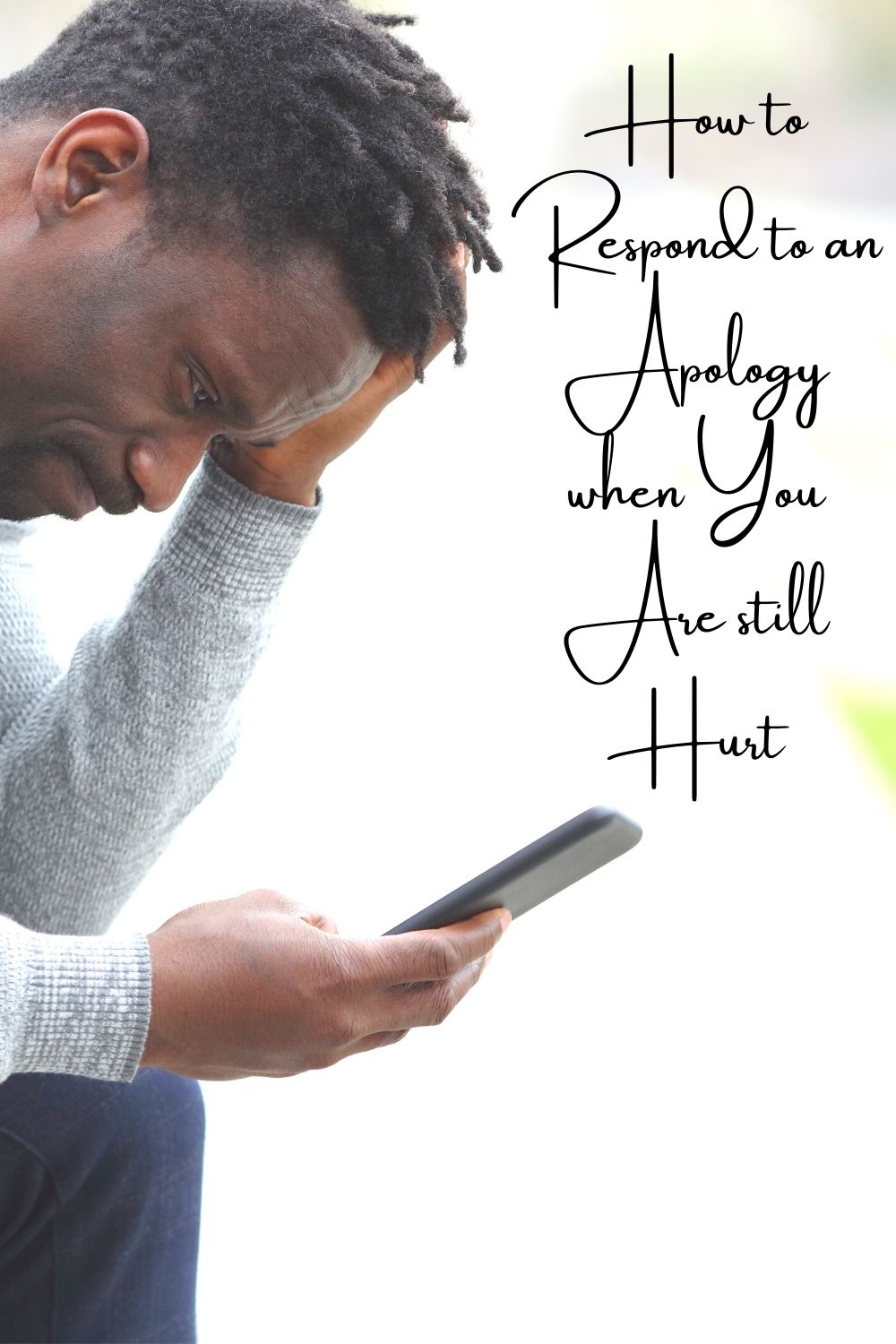Politeness Theory tells us that when someone apologizes to us, we feel like we have to respond by telling them we forgive them.
This can be tricky if we do not actually want to forgive them.
Instead of always saying, “I forgive you, it’s okay,” and then going home in anger because we had to swallow our hurt, we should try to be genuine about how we feel.
Here are fifteen possible ways to respond to an apology when we still feel hurt by what has happened.
15 ways to respond to an apology when you are still hurt
- I’m not ready to forgive you yet. I’m still deeply hurt. I need a bit more time to think things through before we start talking again.
- Thanks for apologizing. I needed to hear that because I am still very hurt by what you did.
- Thanks for saying that. I appreciate the apology, but it will take me some time before I’m ready to forgive you.
- I’m really glad we had this talk. I know it must have been hard for you to apologize. Unfortunately, I’m still not quite ready to move on yet. But I’ll get in touch when I feel ready to talk.
- I appreciate what you’re saying, but until I see a change in your behavior, I won’t be ready to forgive you.
- I’m so glad you came to talk to me. I’m still hurt, but I accept your apology. Let’s leave this in the past.
- Thank you for your apology. I’m still hurt, but I’m ready to try to move on.
- That apology means a lot to me. I still feel betrayed, but I would like to work through this with you.
- Thank you for acknowledging the way you hurt me. I appreciate your efforts to repair things. Let’s see if we can leave what happened behind us now.
- I’m grateful for the apology. I can forgive you, but I won’t forget.
- What you did was so unacceptable that I don’t think I will ever be able to forgive you.
- I hate to say this, but I don’t think I want to repair this relationship. What you did was so hurtful that I doubt I’ll ever be able to move past it.
- That apology does not acknowledge the level of hurt you caused me.
- I think it’s best if we don’t talk anymore. I don’t see myself getting over what happened.
- I appreciate that you are trying to apologize and fix things, but that isn’t what I want. I would prefer it if we just went our separate ways.
How to respond to an apology if you are not ready to forgive yet
It is difficult to forgive someone who has hurt you deeply. And, the truth is, you don’t have to accept every apology you get.
For example, when a friend ghosts you, you don’t have to forgive them right away.
After all, forgiveness that isn’t genuine isn’t forgiveness at all.
Instead of just automatically accepting every apology, take the time to listen to the person apologizing and decide whether you can really move on.
If you think you will be able to forgive one day, but aren’t ready to accept an apology yet, tell the person who has wronged you that while you appreciate the “sorry,” you need more time to work through things.
1. I’m not ready to forgive you yet. I’m still deeply hurt. I need a bit more time to think things through before we start talking again.
In any situation that involves confrontation, it is important to be as clear as you possibly can. After all, words can get twisted and misconstrued.
If you are still too hurt to an accept an apology, state your position as concisely as possible.
Tell the person apologizing to you that you can’t forgive them yet. You are still hurt. You need more time.
This message is sure to be understood.
2. Thanks for apologizing. I needed to hear that because I am still very hurt by what you did.
Even though you may not be able to accept an apology yet, it doesn’t hurt to thank the apologizer for saying sorry. You could even tell them you needed to hear it.
Don’t shy away from an honest assessment of how you feel about what went down. If you’re hurt, let the person who hurt you know.
3. Thanks for saying that. I appreciate the apology, but it will take me some time before I’m ready to forgive you.
You may feel that you need time before you’re ready to forgive. If so, tell the person apologizing to you that you need some space before you commit to trying to repair your relationship.
4. I’m really glad we had this talk. I know it must have been hard for you to apologize. Unfortunately, I’m still not quite ready to move on yet. But I’ll get in touch when I feel ready to talk.
The tricky thing about the people who hurt us is that that they are usually people we are close to. After all, you have to be close to someone to feel betrayed by them.
This means that we sometimes find ourselves hating someone’s behavior even though we still love them.
You may want to show compassion for someone who has hurt you because you still care about them. If so, tell them you understand how difficult it must have been for them to apologize and thank them for taking the time to talk.
That said, just because you can understand what they must be feeling, doesn’t mean you have to invalidate your own feelings by agreeing to forgive them. Instead, tell them that you aren’t ready to move on and will get in touch when you are.
5. I appreciate what you’re saying, but until I see a change in your behavior, I won’t be ready to forgive you.
Sometimes words are not enough. What’s that expression? Oh yes, talk is cheap.
If the person who hurt you is good at saying all the right things but then consistently fails to change their behavior, tell them actions speak louder than words.
When they apologize, let them know that you can’t forgive them until their actions show you that they mean what they say.
How to respond to an apology if you want to try to move on

If someone apologizes to you and you are still hurt, you have a few choices.
One is to tell them that you are not over what happened, but that you are willing to try to work through things.
By agreeing to try to move on you are not signing away your right to feel sad or angry about what happened, you’re simply indicating that you would like to find a way to work through those emotions.
6. I’m so glad you came to talk to me. I’m still hurt, but I accept your apology. Let’s leave this in the past.
No matter how hurt you are, if you love the person who has hurt you, it is worth at least showing a willingness to fix things.
Make it clear that even though you accept their apology, you are still hurt. You are not guaranteeing them a blank slate, you are simply saying that you would like to find a way through the difficulty.
7. Thank you for your apology. I’m still hurt but I’m ready to try to move on.
Keep your response to an apology short and sweet. If someone apologizes and you want to move on and stop re-hashing things, then thank the person who hurt you for their apology.
Tell them in no uncertain terms that you are still hurt but would like to move past it.
Whether the person apologizing is an ex wanting to know how you are, your mother, or your former closest friend, as long as they are truly sorry, there is no harm in trying to move past what has happened.
8. That apology means a lot to me. I still feel betrayed, but I would like to work through this with you.
A sincere apology is a beautiful thing.
We are all only human and we all make mistakes. If we know we’ve messed up, the best thing we can do is reflect on our behavior and then say sorry to the people we have hurt.
If you feel that someone is truly remorseful for their actions, tell them that while you still feel betrayed, you’d like to try to work through things.
9. Thank you for acknowledging the way you hurt me. I appreciate your efforts to repair things. Let’s see if we can leave what happened behind us now.
Some people simply say sorry, while others go the extra mile to try to demonstrate that they want to make things better.
For example, if your partner has hurt you, they may buy you flowers, empty the dishwasher consistently, or cook you breakfast in bed.
If you feel that someone is fully invested in making things up to you, you can say “I appreciate your efforts to repair things.”
If someone feels that you appreciative of their efforts, they will be more likely to continue to try to show you just how remorseful they are.
10. I’m grateful for the apology. I can forgive you, but I won’t forget.
One of the all-time great adages in the English language is “forgive, but don’t forget.” This is a variation of the older adage “forgive and forget.”
The second phrase means to forgive and move on, as in, try not to dwell on the thing that hurt you.
The first one, on the other hand, encourages us to let people who hurt us back in our lives, so long as we remember what they did and remain wary of them in the future.
If you want to forgive someone but also want them to know that you won’t tolerate it if they make the same mistake again, say that you will “forgive but not forget.”

How to respond to an apology if you don’t think you will ever be able to forgive
There are some offenses too egregious to be forgiven. For example, could you forgive a partner who cheated on you with your closest friend? Could you forgive someone who maliciously ruined your career prospects?
There is such a thing as a toxic relationship and there are also toxic friends. The best thing to do if you are in a toxic situation is to cut people out of your life.
If the person apologizing to you has done something unforgivable, let them know that you are too hurt to forgive them, and that you no longer want to have a relationship with them.
11. What you did was so unacceptable that I don’t think I will ever be able to forgive you.
This response is clear and to the point.
Not only do you state why you can’t forgive the person apologizing to you, but you send a clear message that they should not contact you anymore.
12. I hate to say this, but I don’t think I want to repair this relationship. What you did was so hurtful that I doubt I’ll ever be able to move past it.
When someone apologizes, it is usually because they know they have done something wrong.
In fact, many people who apologize aren’t sure they will be forgiven, and they have no right to expect to be.
You should not feel bad if you cannot forgive someone. After all, they have made their bed, and now they must lie in it.
13. That apology does not acknowledge the level of hurt you caused me.
Imagine staring at phone screen, typing and re-typing a message, trying to come up with a way to respond to a breakup text.
“How can they have thought it was okay to break up with me over text?” you wonder.
If someone does something that callous and thinks a simple “sorry” will fix the problem, feel free to let them know that the apology does not match the crime.
Saying that an apology doesn’t acknowledge the level of hurt you feel sends a clear message that you are not willing to engage with the person who wronged you.
14. I think it’s best if we don’t talk anymore. I don’t see myself getting over what happened.
Getting hurt by someone can make us feel really small and insignificant. When we feel betrayed, we feel that we must not matter very much to the person who hurt us.
One way to get over the feeling of being worthless that can sometime arise when we’re hurt, is to be assertive.
Instead of accepting a lackluster apology when you are truly hurt, define your boundaries to the person apologizing and tell them you don’t want to talk to them anymore.
15. I appreciate that you are trying to apologize and fix things, but that isn’t what I want. I would prefer it if we just went our separate ways.
Even if you believe that the person apologizing to you is sincere, that doesn’t mean you have to accept their apology. If you don’t want to talk to them anymore, tell them this.
Let them know you appreciate their desire to fix things, but that you don’t want to smooth things over with them and would rather end your relationship here.

Hey, it’s me, Steven. Dating and relationships have always fascinated me. On Dategosu, you will find my best tips to make sure your next date is a great success!

